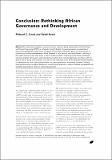| dc.contributor.author | Crook, Richard C. | en |
| dc.contributor.author | Booth, David | en |
| dc.date.accessioned | 2016-01-08T11:15:55Z | |
| dc.date.available | 2016-01-08T11:15:55Z | |
| dc.date.issued | 1/3/2011 | en |
| dc.identifier.citation | Crook, R., C. and Booth, D. (2011) Conclusion: Rethinking African Governance and Development. IDS Bulletin 42(2): 97-101 | en |
| dc.identifier.issn | 1759-5436 | en |
| dc.identifier.uri | https://opendocs.ids.ac.uk/opendocs/handle/20.500.12413/7579 | |
| dc.description.abstract | This article draws together the main strands of argument being developed by the Africa Power and Politics Programme (APPP), as reflected in this IDS Bulletin. The central question is what kinds of governance arrangements work better to support the provision of the public goods that are essential to sustained and inclusive development in Africa. Evidence at local, sectoral and national levels is pointing to the overall conclusion that what works is often a ‘practical hybrid’, combining authoritative coordination with local problem?solving and constructive borrowing from local cultural repertoires. Consistent with the general idea of ‘going with the grain’, we find that the most likely source of the necessary vertical discipline is a developmental form of neo?patrimonialism, not ‘good governance’, as currently conceived. Similarly, local collective action to address bottlenecks in public goods provision is seldom enhanced by standard donor and NGO approaches to citizen or client empowerment. | en |
| dc.format.extent | 5 | en |
| dc.publisher | Blackwell Publishing Ltd | en |
| dc.relation.ispartofseries | IDS Bulletin Vol. 42 Nos. 2 | en |
| dc.rights.uri | http://www.ids.ac.uk/files/dmfile/IDSOpenDocsStandardTermsOfUse.pdf | en |
| dc.title | Conclusion: Rethinking African Governance and Development | en |
| dc.type | Article | en |
| dc.rights.holder | © 2011 The Authors. IDS Bulletin © 2011 Institute of Development Studies | en |
| dc.identifier.doi | 10.1111/j.1759-5436.2011.00215.x | en |

